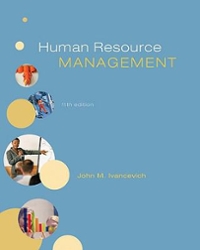Ray Brice expected to retire from United Airlines (UAL) and receive a $1,200-a-month pension. Suddenly hope ran
Question:
Ray Brice expected to retire from United Airlines (UAL) and receive a $1,200-a-month pension. Suddenly hope ran out for Ray Brice and 35,000 other UAL retirees. The government Pension Benefit Guaranty Corp (PBGC) announced it would not guarantee the bankrupt airline's loans--virtually assuring that if the airline's parent company is to remain in business it will have to chop away at expensive pension and retiree medical benefits. The numbers are daunting. UAL owes $598 million in pension payments in the next six months and a total of $4.1 billion by the end of 2008, plus an additional $1 billion for retiree health care benefits, obligations the ailing airline can't begin to meet. And if United finds a way to get out of its promises, competitors American Airlines (AMR), Delta Air Lines (DAL), and Northwest Airlines (NWAC) are sure to try to as well.
UAL workers are about to find out what other airline employees already know: The cost of broken retirement promises can be steep. Of the airline's many crises, the biggest was the pilots' pension plan, a sinkhole of unfunded liabilities.
Why are retirees being left out in the cold? An unsavory brew of factors has come together to put stress on the retirement system like never before. First, there's the simple fact that Americans are living longer in retirement, and that costs more. Next come internal corporate issues, including soaring health care costs and long-term underfunding of pension promises. Perhaps most important, in the global economy, long-established U.S.
companies are competing against younger rivals here and abroad that pay little or nothing toward their workers' retirement, giving the older companies a huge incentive to dump their plans. "The house isn't burning now, but we will have a crisis soon if some of these issues aren't fixed," says Steven A. Kandarian, who ended a two-year stint as the executive director of the Pension Benefit Guaranty Corp. (the little known federal agency that insures private pensions) in February. Kandarian is not optimistic about how that crisis might play out, either. "By that time it will be too late to save the system. Then you just play triage." As industry after industry and company after company strive to limit, or eliminate, their so-called legacy costs, a historic shift is taking place. No one voted on it and Congress never debated the issue, but with little fanfare we have entered into a vast reorganization of our retirement system, from employer funded to employee and government funded, a sort of stealth nationalization of retirement. As the burden moves from companies to individuals-who have traditionally been notoriously poor planners-it becomes near certain that in the end, a bigger portion will fall on the shoulders of taxpayers. "Where the vacuum develops, the government is forced to step in," says Sylvester J. Schieber, a vicepresident at benefit-consulting firm Watson Wyatt Worldwide. "If we think we can walk away from these obligations scot-free, that's just a dream."
Questions
1. Is it ethical for a company to promise benefits and then years later walk away from the promise? Discuss.
2. Should the government pay for all pension guarantees?
3. Why is retiree health care coverage easier to eliminate than pension benefits?
Step by Step Answer:






